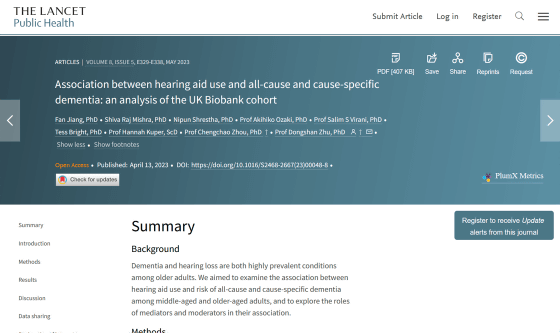People with hearing loss may be able to reduce the risk of dementia by using hearing aids

Dementia has become a major threat to people around the world, and in recent years,
Association between hearing aid use and all-cause and cause-specific dementia: an analysis of the UK Biobank cohort - The Lancet Public Health
https://doi.org/10.1016/S2468-2667(23)00048-8

Hearing Aids May Protect Against a Higher Risk of Dementia Associated With Hearing Loss - Neuroscience News
https://neurosciencenews.com/hearing-loss-dementia-23019/
Hearing aids could help cut the risk of dementia, study finds | Dementia |
https://www.theguardian.com/society/2023/apr/13/hearing-aids-could-help-cut-the-risk-of-dementia-study-finds
The number of dementia patients is on the rise worldwide, and if effective measures are not taken, the number of dementia patients worldwide in 2050 will reach 153 million , nearly three times the number in 2019. There is also a prediction of A review published in the medical journal The Lancet in 2022 suggests that hearing loss is associated with approximately 8% of dementia cases worldwide, and the link between hearing loss and dementia has attracted attention in recent years. I'm here.
Therefore, an international research team from China, Australia, Japan, etc., based on the data of 437,704 people included in the UK Biobank , which tracks the health status of middle-aged and elderly people in the UK over the long term, examined the presence or absence of hearing loss, hearing aid use, and cognition. We analyzed the diagnosis history of the disease. At the start of the UK Biobank data collection, the average age of subjects was 56 years and the average follow-up period was 12 years.
Dr. Dongshan Zhu, co-author of the paper and professor of epidemiology at Shandong University in China, said: 'Evidence builds that hearing loss is the most influential and potentially modifiable risk factor for middle-aged dementia. It remains unclear whether hearing aid use is effective in reducing dementia risk in the real world.'

About three-quarters of the subjects, 325,882, had no hearing loss, and the remaining 111,822 had some degree of hearing loss. And 13,092 people, or 11.7% of the hearing-impaired, used hearing aids, but many people were hearing-impaired but did not use hearing aids.
An analysis of the factors involved in the risk of dementia found that people with hearing loss who did not use hearing aids had a 42% higher risk of developing dementia compared to those with normal hearing. bottom. On the other hand, people with hearing loss but using hearing aids did not have an increased risk of dementia.
'This study is the best so far, suggesting that hearing aids could be a minimally invasive and cost-effective treatment to mitigate the potential impact of hearing loss on dementia,' said Dr. Dongshan. It provides evidence,” he said.

The study also showed that many people with hearing loss in the UK do not use hearing aids. Since hearing loss can begin in the early 40s, hearing-impaired patients who do not use hearing aids may continue to experience gradual cognitive decline over decades into their 60s and 70s, when they are more prone to dementia.
Dr. Dongshan said, 'These findings underscore the urgent need for early introduction of hearing aids when hearing problems begin. Raise awareness of the link between hearing loss and dementia. reducing the cost and improving access to hearing aids; screening primary care workers for hearing impairment; increasing awareness of the need for hearing aids; It is necessary for society as a whole to make efforts such as
On the other hand, the results of this study only found a relationship, and the underlying mechanism by which the use of hearing aids affects dementia has not been established. Surveys of patient conditions are self-reported and therefore may contain biases, and ``people who use hearing aids because of hearing loss may be more concerned about other health conditions.'' There is also the possibility that there is a hidden factor such as Another limitation of the study was that the UK Biobank subjects were mostly Caucasian, and few were congenitally deaf or had a history of hearing loss.
Still, Dr Gill Livingston, from

Related Posts:
in Science, Posted by log1h_ik







